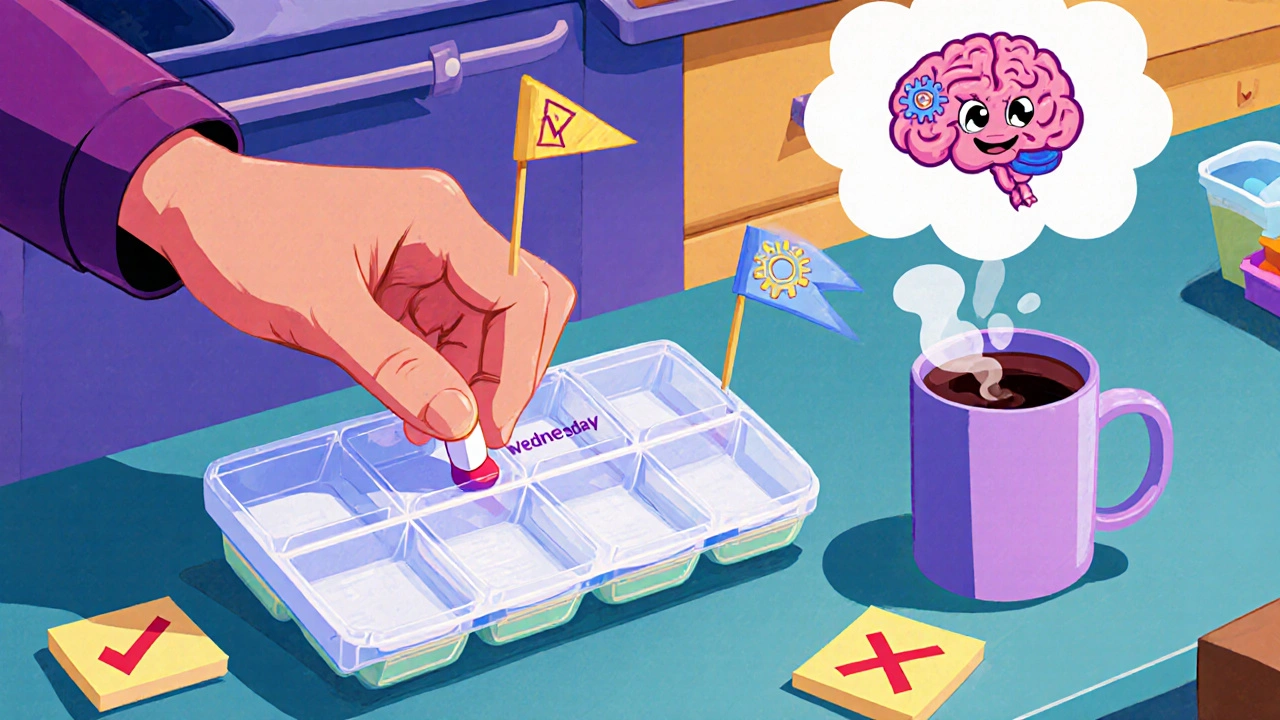Taking your medication every day shouldn’t feel like a chore. Yet for millions of people managing chronic conditions-whether it’s high blood pressure, diabetes, depression, or asthma-it does. The problem isn’t always forgetfulness. It’s that taking pills feels like an extra task on top of an already full day. But here’s the good news: you don’t need to rely on willpower alone. Behavioral tricks can turn medication-taking into something automatic, like brushing your teeth or brewing coffee in the morning.
Start with the simplest change: Tie it to an existing habit
Your brain loves routines. It’s easier to stick to something when it’s attached to something you already do without thinking. This is called habit stacking. If you brush your teeth every morning and night, take your pills right after. Same with breakfast, dinner, or bedtime. Don’t try to create a new time. Just piggyback on what’s already there. A 2020 study in Patient Preference and Adherence found that people who linked their medication to an existing daily routine improved adherence by 15.8%. Why? Because the cue (brushing teeth) triggers the behavior (taking pills) without needing to remember or decide. No mental effort. No guilt when you miss it-you just didn’t brush your teeth that day. Try this: Write down your current daily routine. Circle three things you do every day without fail. Pick one. Attach your medication to it. Do it for 21 days. That’s all it takes to start wiring it into your brain.Use a pill organizer-but not just any kind
Pill organizers are common. But most people use them wrong. Just putting pills in a box doesn’t fix the problem. The key is using one that shows you what you’ve taken-and what you haven’t. A weekly pill box with compartments for morning, afternoon, and night works best. But here’s the trick: don’t fill it all at once. Fill it every Sunday. Why? Because seeing an empty compartment on Wednesday makes you notice you missed a dose. That visual gap is powerful. It’s not just storage-it’s feedback. Studies show that elderly patients using weekly pill organizers reduced missed doses by 27%. For younger adults, the same system works if you pair it with a simple checklist. Put a sticky note next to the organizer: “Did I take my meds?” Check it off. The act of checking creates a tiny win-and reinforces the behavior.Set reminders that actually work
Phone alarms? Most people turn them off or ignore them. Generic alarms don’t stick. But personalized, context-aware reminders do. A 2021 meta-analysis in JMIR mHealth and uHealth found that smartphone apps with customizable reminders improved adherence by 28.7%. But not all apps are equal. The best ones let you set reminders based on real-life triggers: “Remind me when I open the fridge,” or “Remind me after I get home from work.” Try this: Use your phone’s built-in reminders. Don’t just set “Take pill at 8 AM.” Set “Take pill after I pour my coffee.” Or “Take pill when I sit on the couch to watch the news.” These are context-based cues your brain already recognizes. They’re harder to ignore. Also, turn on vibration. Sound alerts get drowned out. A gentle buzz in your pocket or on your wrist? That’s harder to miss.Track your progress visually
Humans respond to progress. You’ve seen this with fitness trackers, savings goals, or even coloring books for adults. Medication adherence works the same way. Create a simple calendar. Print one or use a sticky note on your fridge. Every day you take your meds, mark an X. After five days in a row, color it in. After seven, put a star. After a month, treat yourself to something small-a coffee, a walk in the park, an episode of your favorite show. This isn’t just motivational. It’s neurological. Seeing a chain of X’s activates the brain’s reward system. Missing a day breaks the chain-and that discomfort motivates you to restart. A 2021 trial in the Journal of Clinical Psychiatry showed that people who tracked their medication daily improved adherence by 22.7%.
Make it easier: Reduce the number of pills
If you’re taking five different pills at different times, your brain is overwhelmed. That’s not laziness. It’s biology. A 2011 meta-analysis of over 21,000 patients found that switching to a single-pill combination (like a blood pressure pill that includes three drugs in one) boosted adherence by 26%. Fewer pills = fewer decisions = fewer chances to skip. Talk to your doctor or pharmacist. Ask: “Can any of these be combined?” “Is there a long-acting version?” “Can I switch to a once-daily dose?” One patient I know took eight pills a day. After a medication review, her doctor consolidated them into three. Her adherence jumped from 60% to 92% in three months. She didn’t change her habits. She just changed her pills.Use motivation, not guilt
Most people try to motivate themselves with fear: “If I don’t take this, I’ll end up in the hospital.” That works for a day or two. Then it fades. Better approach: Connect your medication to something you care about. Not “I need to take this to live longer.” But “I take this so I can play with my grandkids without being winded.” Or “I take this so I can go back to hiking on weekends.” Motivational interviewing-a technique used by therapists and trained pharmacists-helps people find their own reasons. A 2020 review of 34 trials showed it improved adherence by 22.1%. You don’t need a therapist to do this. Just ask yourself: “What’s one thing I want to be able to do that this medication helps with?” Write it down. Keep it visible.Get help from your pharmacy
Your pharmacy isn’t just a place to pick up pills. Many offer free services that boost adherence. Ask about auto-refill programs. These automatically refill your prescription before you run out. No calls. No trips to the pharmacy. Just pick up when it’s ready. Research shows this improves medication continuity by 33.4%. Some pharmacies also offer blister packs with your name and times printed on them. Others send text reminders. These aren’t gimmicks-they’re tools backed by data.
For tough cases: Think beyond pills
Sometimes, the problem isn’t forgetfulness. It’s fear. Cost. Side effects. Distrust. If you’ve tried all the tricks and still skip doses, the issue might be deeper. For people with mental illness, studies show that cognitive behavioral therapy (CBT) tailored to medication adherence improves adherence by nearly 30%. For low-income patients, financial assistance programs cut non-adherence by over a third. If cost is the barrier, ask about generic options, patient assistance programs, or mail-order pharmacies. If side effects are the problem, talk to your doctor. There’s almost always an alternative. And if you’re overwhelmed? Consider long-acting injectables. For conditions like schizophrenia or bipolar disorder, these shots last weeks or months. No daily pills. No reminders. Just one appointment every few weeks. A 2022 meta-analysis found they reduced non-adherence by 57% compared to oral meds.It’s not about discipline. It’s about design.
You don’t need to be stronger. You don’t need to be more organized. You need a system that works with your brain, not against it. The most effective behavioral tricks are simple, visual, tied to routines, and low-effort. They remove the need to decide. They make the right choice the easiest one. Start with one trick. Just one. Tie your pill to your morning coffee. Use a weekly organizer. Set one context-based reminder. Track it on a calendar. After a week, add another. Don’t try to fix everything at once. Habit formation isn’t a sprint. It’s a slow, steady build. And if you miss a day? Don’t quit. Just start again tomorrow. No guilt. No drama. Just the next pill. The next X on the calendar. The next cup of coffee. Because consistency isn’t about perfection. It’s about showing up-even when it’s messy.What’s the most effective behavioral trick for medication adherence?
The most effective trick is combining habit stacking with a visual tracker. Tying your medication to an existing daily routine (like brushing your teeth) reduces decision fatigue, while marking each day on a calendar creates accountability. Studies show this combo improves adherence by up to 22.7%, more than any single tool alone.
Do phone reminders really work for taking medication?
Yes-but only if they’re personalized. Generic alarms at 8 AM are ignored. Context-based reminders (like “Take pill after breakfast”) tied to real-life cues work far better. A 2021 study found smartphone reminders improved adherence by 28.7% when they were specific, repeatable, and used vibration instead of sound.
Can I use a pill organizer if I take different doses at different times?
Absolutely. Use a multi-compartment organizer with separate sections for morning, afternoon, evening, and night. Fill it weekly. Seeing an empty compartment makes it obvious if you missed a dose. This visual feedback is more effective than digital alerts for many people, especially older adults.
Why do I keep forgetting my pills even when I know they’re important?
Your brain doesn’t prioritize tasks based on importance-it prioritizes based on ease and repetition. If taking pills requires effort, memory, or decision-making, your brain will avoid it. Behavioral tricks remove those barriers by making the action automatic, visible, and tied to something you already do every day.
Is it better to take medication at the same time every day?
Yes. Consistency matters more than the exact time. Taking your pill at 8:05 AM one day and 8:15 AM the next is fine. But taking it at 8 AM one day and 11 PM the next breaks the habit loop. Pick a time that fits your routine-and stick to it. Research shows this alone improves adherence by 15.8%.
What if I can’t afford my medication?
No behavioral trick works if you can’t access the medicine. Talk to your pharmacist about generic options, patient assistance programs, or mail-order pharmacies. Many drug manufacturers offer free or low-cost programs for eligible patients. In one 2022 study, financial support improved medication persistence by 34.2% in low-income patients.
Can my pharmacist help me build a medication habit?
Yes. Many pharmacists now offer medication therapy management (MTM) services at no extra cost. They can help you simplify your regimen, set up auto-refills, recommend pill organizers, and even set up text reminders. Ask if your pharmacy offers these services-they’re designed exactly for this.


I tried the habit stacking thing and it WORKED. 🎉 I take my blood pressure pills right after I brush my teeth now. No more guilt, no more reminders. My doctor was shocked. I didn't even try hard. Just linked it to something I already do. Life hack unlocked. 🥳
This is such basic behavioral psychology. You didn't need a blog post to figure out cue-response loops. If you can't tie a pill to brushing your teeth, maybe you shouldn't be managing chronic illness.
Honestly, this is the most practical advice I've seen on meds in years. No fluff. Just real stuff that works. I've been using the calendar tracker for 3 weeks now. 21 X's in a row. Feels good. Not because I'm perfect, but because I keep showing up.
To anyone reading this who feels overwhelmed: you're not failing. Your system is just broken. Start with one thing. One tiny habit. One X on the calendar. That’s enough. Progress isn’t loud. It’s quiet. And it’s yours.
The neurocognitive architecture of habit formation via associative conditioning is fundamentally rooted in operant reinforcement loops. The visual feedback mechanism activates the dorsal striatum, reducing prefrontal load. The pill organizer functions as an external cognitive scaffold. The context-aware triggers leverage embodied cognition. This is not 'trickery'-it's applied behavioral neuroscience.
I used to hate taking my antidepressants. Then I started pairing them with my morning tea. Now I feel weird if I don’t. The calendar thing? I made a little paper chain. Each link is a day. I cut one off every time I skip. The chain gets shorter. It hurts to see it shrink. So I don’t. It’s not about willpower. It’s about making the cost of skipping visible.
I used to forget my pills like it was a hobby. Then I started putting them in my sock drawer. Every morning, I put on my socks, see the pill cup, and boom-taken. No alarms. No apps. Just socks. Simple. Dumb. Works. Don’t overthink it.
I’m sorry, but this is just behavioral navel-gazing. If your medication adherence is this fragile, maybe you’re on the wrong meds. Or your doctor isn’t listening. Or your insurance is garbage. No amount of sticky notes fixes systemic failure.
I tried the calendar. Then I missed one day. And I just… stopped. Like, I didn’t even try again for two weeks. I felt so guilty I couldn’t face it. Like I’d failed a test. Maybe the system is rigged. Maybe we’re supposed to fail. Maybe this is how they keep us docile.
The empirical data presented herein is methodologically sound. However, the implicit assumption that adherence is a binary variable (taken/not taken) neglects the pharmacokinetic variance inherent in individual metabolic profiles. A more robust metric would include serum concentration monitoring over time.
Oh wow. You mean if I just… do the thing? And link it to coffee? And use a box? And mark an X? Holy hell. I’ve been paying $200 a month for therapy to figure this out. Can I get a refund?
I’ve been using the weekly organizer since last year. I fill it every Sunday morning with my tea. It’s become part of my ritual. And when I see an empty compartment? I don’t panic. I just fill it the next day. No drama. No guilt. Just the next pill. That’s the whole point, isn’t it?
In India, we have a phrase: 'Dawa kha lo, zindagi bachao.' Take the medicine, save your life. But here’s the truth-most of us can’t afford it. No pill organizer helps if the pharmacy is 50 km away and the pill costs your daily wage. This advice is useless without access.
You people are so naive. You think tying pills to coffee fixes everything? What about the people who can’t afford coffee? Who don’t have a fridge? Who don’t have a calendar? Who are too tired to even open their eyes? This isn’t advice. It’s privilege dressed as wisdom.
I read this and thought: ‘This guy has never missed a dose in his life.’ I’ve been on 8 meds for 12 years. I’ve forgotten. I’ve lied. I’ve thrown them out. I’ve cried. I’ve begged my doctor to change them. None of this ‘trick’ stuff works if you’re drowning. You don’t need a system. You need a lifeline.